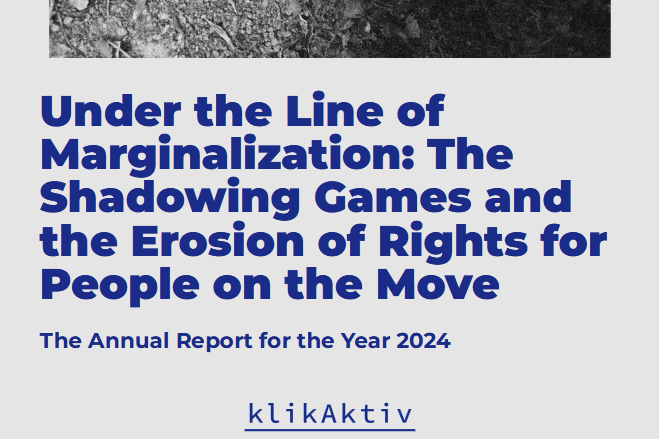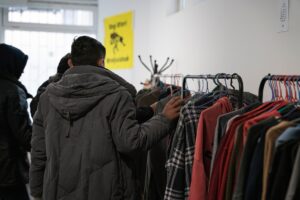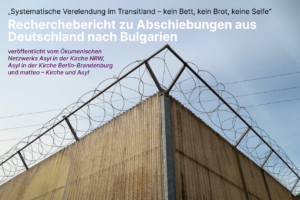Our partner organization in Serbia, klikAktiv, has published its annual report “Under the Line of Marginalization: The Shadowing Games and the Erosion of Rights for People on the Move” which covers the situation on the ground for refugees throughout the year 2024, with an overview of the new developments, EU external borders and migratory policies of state institutions.
Some of the key trends identified in the previous year were:
👉 Sharp decrease in people in official, state-run camps and still no effective access to asylum in Serbia:
Only 19,603 people on the move were recorded in official accommodation facilities, marking an 82% decrease compared to 2023. The average stay was just 14 days, indicating that Serbia remains a transit country rather than a place of long-term residence or protection. Just 850 people expressed intention to seek asylum, only 219 formally applied for asylum, and a mere 7 individuals were granted protection. This underscores the persistent dysfunction of the asylum system, with extremely low application and approval rates.
👉 Widespread use of return and detention procedures:
The Ministry of Interior issued 12,551 return decisions, mostly to Syrians, Afghans, and Turks. 436 individuals were placed in detention centers; only 11 accessed legal remedy, out of which just 1 case was successful.
👉 Ongoing and systematic pushbacks in addition to readmission practice:
Klikaktiv documented continued violent pushbacks from Hungary and Croatia, as well as push-backs from the Serbian south borders Readmission of third country nationals under the EU – Serbia deal was on the raise in 2024: Serbia accepted most of the third country nationals from Croatia, while it also returned people back to Bulgaria, under the same Agreement
👉 Expansion of Frontex operations across Serbia:
A new Frontex Status Agreement allows the agency to operate throughout Serbia, not just at EU borders. Frontex can now perform border checks, patrols, and migration control inside Serbia, raising concerns about the externalization of EU migration policy.
👉 Impact of the fall of the Assad regime in Syria:
Although the war in Syria is still ongoing, the collapse of the Assad regime prompted several European countries to suspend Syrian asylum applications. This could have serious implications for Syrians in Serbia, who may face reduced chances of international protection or even pressure to return.
👉 Continued presence of people in informal settlements:
Despite fewer people in camps, many people on the move avoid official accommodation, relying instead on squats or smugglers, often due to fear of detention or deportation.
👉 Rise in labor migration to Serbia:
Serbia is facing a labor shortage and has become a destination for foreign workers, a shift from its traditional role as a country of emigration. You can find more information about these topics in our report which is attached to this email and is also available on Klikaktiv’s website and following link.
Previous Klikaktiv reports are also available on their website!





